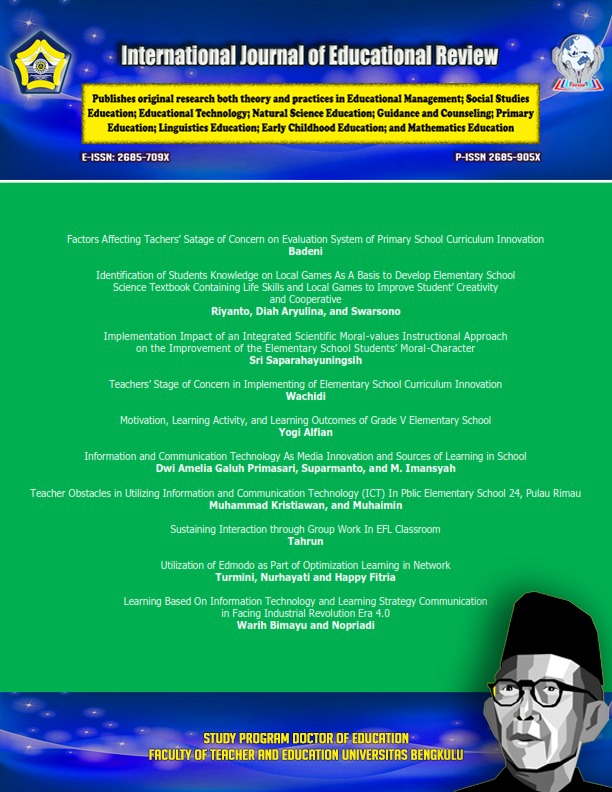Basic Competency Level Of Vocational Teachers In Understanding The Curriculum 2013
DOI:
https://doi.org/10.33369/ijer.v4i2.24107Keywords:
Understanding, Basic Competencies, Curriculum of 2013Abstract
The general purpose of this research is to determine the basic level of Competence of vocational teachers in understanding the Curriculum in 2013 in Bengkulu City. The specific purpose of this research is: (1) To find out the level of professional Competence of vocational teachers in understanding the Curriculum in 2013 in Bengkulu City; (b) To find out the level of pedagogic Competence of vocational teachers in understanding the Curriculum in 2013 in Bengkulu City; (c) To find out the level of personality competence of vocational teachers in understanding the Curriculum in 2013 in Bengkulu City; (d) To find out the level of social Competence of vocational teachers in understanding the 2013 curriculum in Bengkulu City. This research method uses a descriptive-analytical research approach. This research wants to describe the basic competency level of vocational teachers in understanding the Curriculum in 2013. This research place is at SMK in Bengkulu City. The population in this research were all vocational teachers in Bengkulu City. This research sample relates to the level of Competence of vocational teachers in understanding the Curriculum in 2013, amounting to 50 teachers. Sampling is used using random sampling techniques with lottery techniques—data collection techniques using questionnaires and documents. Questionnaires are used to trace data on the basic level of Competence of vocational teachers in understanding the Curriculum in 2013. To see and prove that the questionnaire is valid is done expert validation. The document was used to collect data on the number of teachers in SMK Kota Bengkulu. After the data is verified, processed with statistical percentage techniques, analyzed, and made conclusions. The study concluded that: (1) The level of pedagogical Competence of teachers of SMK Kota Bengkulu in understanding the Curriculum in 2013 amounted to 52% (Very UnderstandingUnderstanding) and 48% (Sufficient Understanding); (2) The level of professional Competence of teachers of SMK Kota Bengkulu in understanding the Curriculum in 2013 amounted to 31.5% (Sufficient Understanding) and 68.5 % (Very UnderstandingUnderstanding); (3) The level of personality competence of teachers of SMK Kota Bengkulu in understanding the Curriculum in 2013 amounted to 17.3% (Sufficient Understanding) and 82.6 % (Very UnderstandingUnderstanding); (4) The level of social Competence of teachers of SMK Kota Bengkulu in understanding the Curriculum in 2013 amounted to 42.4% (Sufficient Understanding) and 56.6% (Very UnderstandingUnderstanding).
References
Andriani, Dwi Nila. 2017. Kompetensi Profesional Guru, Motivasi Belajar, dan Gaya
Belajar Berpengaruh terhadap Pemahaman Ekonomi siswa Kelas XI IPS di SMK Negeri I Gondang Nganjuk. Skripsi. (t.p.).
Anonim, (2003). Undang-Undang Sistem Pendidikan Nasional No.20 Tahun 2003. Jakarta: (t.P).
Beauchamp, George. 1981. Curriculum Theory. Wilmette, Illinois: The Kagg Press.
Canni Lorence Sianturi. (2013). Asessmen Kebutuhan Pengembangan Profesionasme Guru SMK. Jurnal Pendidikan Humaniora. Malang: Vol 1, No 1.
Danim, Sudarwan. 2003. Visi Baru Manajemen Sekolah. Jakarta: BumiAksara.
Dalrohman, Muh Arif. 2018. Pengembangan Kompetensi Profesional Guru SMK di Kecamatan Pleret Kabupaten Bantul Yogyakarta. Skripsi. (t.p.)
Depdiknas. 2006. Hasil Penelitian Balitbang Dikbud. Jakarta: Departemen
Pendidikan Dasar dan Menengah.
Dina Munawarah. 2013. Kompetensi Sosial guru dan Relevansinya dengan Pembentukan Kharakter siswa di SMK Negeri Nglipar Gunung Kidul. (Skrpsi), (t.p.)
Endrawati, Muri. 2008. Analisis Kompetensi Profesional Guru dalam Interaksi Belajar Mengajar di SMK Negeri 1 Sukaharjo Tahun 2008/2009. Skripsi. (t.p.).
Feralys Novauli. (2017). Pengaruh Kompetensi Guru terhadap Peningkatan Prestasi Belajar pada SMP Negeri di Kota Banda Aceh. Skripsi.
Gusti Bujang, Noveria Novi. 2019. Analisis Kompetnsi Profesional Guru dalam Pembelajaran Sosiologi di Kelas X SMK Adisucipto Sungai Raya. Skrispsi. (t.p.)
Khoimah. 2013. Pengaruh Kompetensi Kepribadian guru terhadap Aqidah Akhlak Siswa Kelas VIII MTS Al-Hikmah Bandar Lampung. Skripsi. (t.p.).
Hass, Glen. (1997). Curriculum Planning A New Approach. Boston: University of Florida.
Iwantoro, Nur. 2016. Kompetensi Paedagogik. Malang: Genta Group Production.
Moeherino. 2016. Pengukuran Kinerja Berbasis Kompetensi. Jakarta: Raja Grafindo Persada
Mulyani, Sumantri. 1988. Kurikulum dan Pengajaran. Jakarta: Departemen
Pendidikan dan Kebudayaan, Direkktorat Jendral Pendidikan Tinggi, Proyek Pengembangan Lembaga Pendidikan Tenaga Kependidikan.
Mulyasa. Enco. 2011. Menjadi Guru Profesional, Menciptakan Pembelajaran Kreatif. Dan Menyenangkan. Bandung: PT Remaja Rosda Karya,
Nasution. 1988. Asas-asas Kurikulum. Bandung. Rosda Karya.
Radicha Florence. 2015. Kompetensi Pedagogik Guru Sekolah Menengah Kejuruan Negeri 2 Pariaman. Skripsi. Fakultas Ilmu Pendidikan Universitas Negeri Padang. (t.p).
Riyanti R. Laro. 2016. Pengarus Kompetensi Pedagogik Guru terhadap Motivasi Belajar Siswa di SMK ariwisata Bubohu Kabupaten Gorontalo. Skripsi. Pendidikan Ekonomi. (t.p).
Ridha. 2013. Pengaruh Kompetensi Kepribadian guru PAI terhadap Pembentukan Karakter siswa di SDIT Rabbani Kota Bengkulu. Skrpsi. (t.p)
Roestiyah, N.K. 1982. Masalah-masalah Ilmu Keguruan. Jakarta: Bina Aksara.
Stephen Isaac dan William B. Michael. 1982. Handbook in Research and Evaluation. Los Angeles California: University of Southern California.
Rustiyaningsih. (2011). Siswa terhadap Kompetensi Guru (Studi Kasus di SMK Negeri 1 Cilacap. Semarang Universitas Negeri Semarang. (t.p)
Sukmadinata, Nana Syaodih. 1997. Pengembangan Kurikulum: Teori dan Praktik. Bandung: Rosda Karya.
Taba, Hilda. (1962). Curriculum Development: Theory and Practice. New York: Harcourt Brace and World, Inc.
Downloads
Published
How to Cite
Issue
Section
License

This work is licensed under a Creative Commons Attribution-ShareAlike 4.0 International License.




